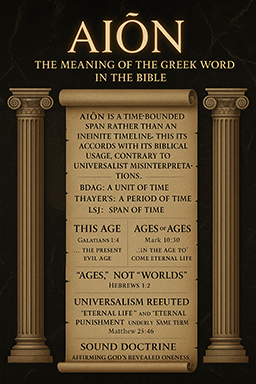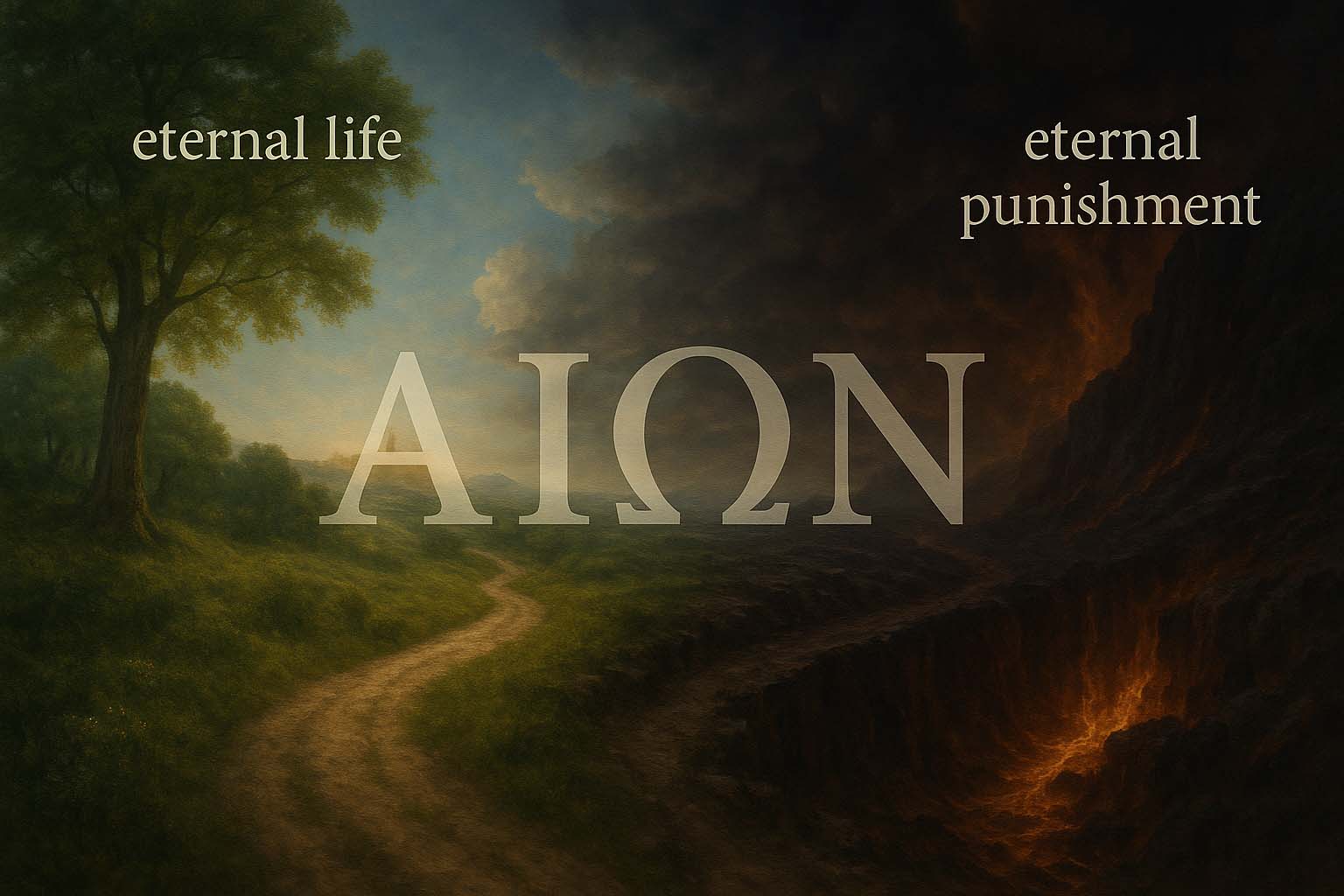Article
Search Articles
Listen
Download Article Study Sheet
Get the study sheet to review the highlights of this article.
Download SummaryRelated Articles
Get The Infographic
Get the full sized infopgraphic overview highlighting the key points discussed in this article.
Download Now
What Aiōn Really Means: Restoring Biblical Clarity, Refuting Misuse in Hebrews 1:2 and Universalism
 Loading author...
Loading author...

I. Introduction: When One Word Changes Everything
The precision of Scripture hinges on the meaning of its words. One such word—often misunderstood, mistranslated, and manipulated—is the Greek term αἰών (aiōn). For centuries, it has been variously translated as "world," "eternity," "age," and "forever," but its true meaning carries a nuanced temporal character that resists such simplistic rendering.
When aiōn is handled carelessly, it can reshape major doctrines, such as the identity of Jesus in creation (Hebrews 1:2), or even the duration of divine judgment, as argued by proponents of universal salvation. This essay sets out to define aiōn precisely, correct its common abuses, and defend the integrity of God's justice and oneness.
II. What Does Aiōn Actually Mean?
1. Lexical Origin and Classical Use
In both classical and Koine Greek, αἰών (aiōn) refers to a long but finite period of time—an "age," "era," or "epoch." It is a time-bounded span, sometimes indefinite, but never inherently infinite.
Greek lexicons consistently affirm this:
- BDAG: "a segment of time, age"
- Thayer's: "an unbroken age, perpetuity of time, the world (universe); period of time, age"
- LSJ (Liddell-Scott-Jones): "lifetime, life, generation, long space of time, age"
In Homer, aiōn often meant "life" or "lifetime." Later, it evolved to mean a "historical age" or "dispensation."
It is important to note: Greek has other words that convey true eternity:
- ἀΐδιος (aidios) -- "everlasting, eternal"
- ἀτελεύτητος (ateleutētos) -- "endless, without termination"
But aiōn—and its adjective form aiōnios—does not carry that meaning by default.
2. Biblical Use: Time Periods and Eras
In the New Testament, aiōn is used in multiple temporal senses:
- "This age" -- the present world system (Gal. 1:4, Matt. 13:22)
- "The age to come" -- the Messianic or future divine era (Mark 10:30)
- "Before the ages" -- referring to pre-creation divine planning (1 Cor. 2:7)
- "The end of the age" -- pointing to judgment (Matt. 24:3)
Sometimes aiōn is stacked for emphasis:
- "Unto the ages of the ages" (eis tous aiōnas tōn aiōnōn), often rendered "forever and ever," expresses compound duration, not an abstract metaphysical eternity.
In short, "aiōn" always retains a temporal framework—a defined or definable age.
III. The Mistranslation in Hebrews 1:2: "Worlds" vs. "Ages"
1. Examining the Greek Text
"Through whom also He made the worlds." (Hebrews 1:2, KJV)
Greek: δι' οὗ καὶ ἐποίησεν τοὺς αἰῶνας
Literal: "through whom also He made the ages."
This passage is central to Trinitarian efforts to prove that the pre-existent Son was the divine agent of creation. However, that conclusion is based on a critical mistranslation.
- The word translated "worlds" is τοὺς αἰῶνας (tous aiōnas) — literally "the ages," not "worlds" (kosmous).
- Nowhere in the New Testament is aiōn used to refer to the physical universe.
- The KJV's choice of "worlds" imposes a cosmological reading that the Greek text does not support.
2. Correct Understanding: God Created the Ages
What Hebrews 1:2 says is that God created the ages, or eras of redemptive history, through the vessel of His Word—Jesus Christ. This aligns with a monotheistic reading:
- God alone declares Himself as Creator: "I am the LORD... that stretcheth forth the heavens alone; that spreadeth abroad the earth by myself." (Isa. 44:24)
- The "whom" through which He made the ages is not an independent divine being, but the man Christ Jesus, foreordained before time began (1 Pet. 1:20).
The text does not suggest that a separate divine "Son" created galaxies or matter. Instead, it honors the plan and purpose of God manifested in the man Christ Jesus—through whom God inaugurated and governs the timeline of salvation history.
IV. The Theological Impact: Upholding God's Oneness
To attribute the making of the universe to a separate "eternal Son" is to contradict the oneness of God and to insert a second divine will into the Godhead. If the Son created anything apart from the Father, then God is no longer one in person, but divided in function and essence.
✅ Scriptural Alignment:
- Malachi 2:10: "Have we not all one father? hath not one God created us?"
- Isaiah 45:12: "I have made the earth, and created man upon it: I, even my hands, have stretched out the heavens."
By correctly reading aiōn as "ages," we preserve the biblical witness that God alone is Creator, and Jesus is the visible image of the invisible God (Col. 1:15), not a second god or co-eternal Son.
V. Refuting Universal Salvation: The Limits of Aiōn
Some theologians, particularly universalists, seize upon the age-bound nature of aiōn to argue that judgment is not eternal, and thus all souls—including Satan and demons—will eventually be saved.
Their logic is as follows:
- Aiōnios kolasis (Matt. 25:46) = "age-lasting punishment"
- Therefore, punishment is temporary, not permanent
- All will eventually be restored, even after Hell
This argument fails for several reasons:
1. Eternal Life and Judgment Share the Same Word
Matthew 25:46 uses the exact same adjective—aiōnios—for both outcomes:
"And these shall go away into eternal punishment, but the righteous into eternal life."
If aiōnios means "temporary" when describing punishment, it must also mean "temporary" when describing life. But eternal life is clearly everlasting (John 10:28, Romans 6:23). The implication is that aiōnios, when used in a divine context, refers to a final and unending state, not a probationary one.
2. The Phrase "Ages of the Ages" Implies Finality
In Revelation 20:10, Satan is cast into the lake of fire and tormented:
"...day and night unto the ages of the ages (εἰς τοὺς αἰῶνας τῶν αἰώνων)."
This is the most emphatic temporal phrase available in Greek. It does not suggest eventual restoration—it emphasizes unending, compounded judgment.
This phrase is used only for:
- The duration of God's reign (Rev. 11:15)
- The worship of the Lamb (Rev. 5:13)
- The punishment of the devil (Rev. 20:10)
It is never used to describe temporary processes.
3. Scripture Declares No Second Chance After Death
"It is appointed unto men once to die, but after this the judgment." (Hebrews 9:27)
There is no hint of purgatory, remedial punishment, or post-judgment reconciliation. The door is shut once judgment falls. Universalism flatly contradicts this irreversible outcome.
4. God's Justice Is Not Cosmetic
The idea that God threatens eternal punishment but only administers temporary discomfort undermines His integrity. The warnings of hell, the urgency of repentance, and the blood of Christ are reduced to cosmic theater under a universalist view.
VI. Conclusion: The Restoration of a Word Restores Truth
The Greek word aiōn means what it meant from the beginning: a defined period of time. Translators and theologians who stretch its meaning into "eternity" or "world" have imposed their own theology onto the inspired text.
By restoring aiōn to its rightful place:
- We clarify Hebrews 1:2, preserving the oneness of God in creation
- We defend the eternality of life and judgment, refuting universalist distortions
- We anchor the gospel in truthful language, not tradition-driven interpretation
Jesus did not create the cosmos as a separate eternal being. He is the one God manifest in time, through whom God established the ages of redemption. And while God's mercy is enduring, His judgment is final—and those who reject Him do not enter another age of opportunity, but eternal separation.
Let the meaning of aiōn be restored, and with it, let the authority of Scripture and the purity of doctrine shine without compromise.